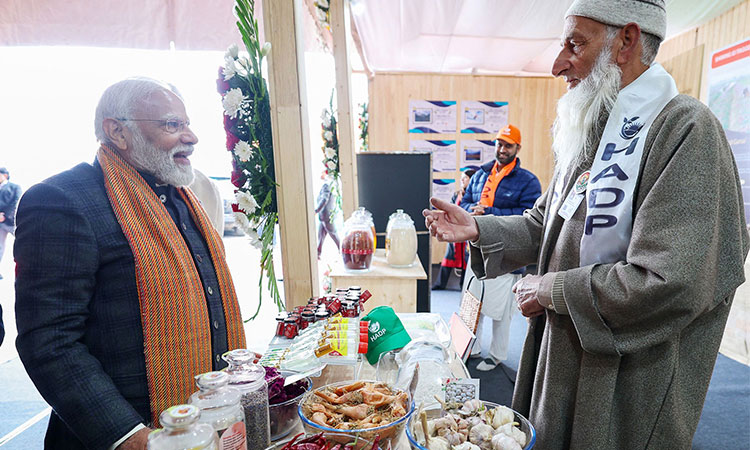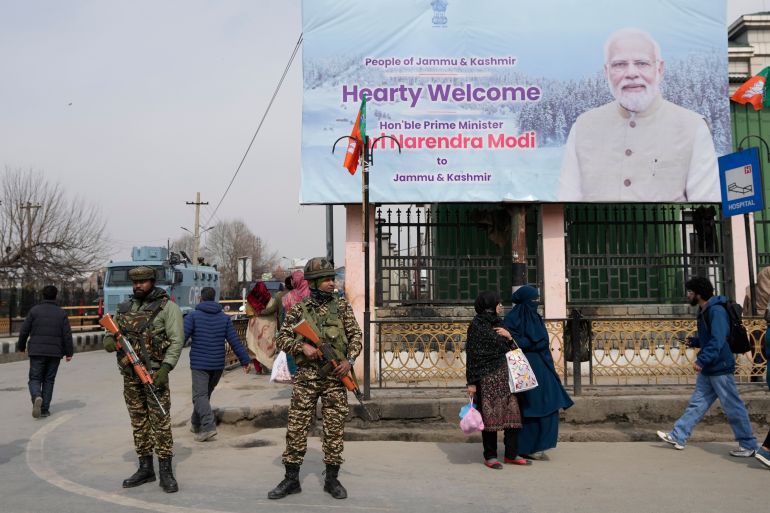
Why are Balochistan’s political parties up in arms?
The controversial election results and the manner in which they have come about have sparked widespread protests across the province.
Balochistan — Pakistan’s largest province by land area as well the most mineral-rich — has nearly been at a standstill for around three weeks as thousands of protesters have taken to the streets, intermittently blocking main highways, cities, and roads since the February 8 general elections.
Almost every major city and town in the province — from the Makran coast near the Iranian border to Chaman next to Afghanistan — has witnessed demonstrations and political rallies as Baloch and Pashtun ethno-nationalist parties, along with minority Hazaras, have taken to the streets, decrying what they term as “stealing the public mandate”.
But this is probably news to you. For even as the fire rages across the province, there has been little mention of it in the mainstream media, whose entire focus has been the election of the Punjab chief minister, the fate of the independents backed by the Pakistan Tehreek-i-Insaf (PTI), and the wheelings and dealings of the Pakistan Peoples Party (PPP) and the Pakistan Muslim League-Nawaz (PML-N) as they join hands to form a coalition government in the Centre yet again.
This is hardly surprising, though, considering Balochistan — the site of a violent separatist insurgency, the gateway to the much-touted China-Pakistan Economic Corridor, and home to Reko Diq, one of the largest copper and gold reserves in the world — rarely ever features in the mainstream narrative, unless there is a violent episode.
Surprising results
To be fair, there were plenty of incidents of violence in the run-up to the elections, which did receive some airtime on TV channels and a few news stories here and there on digital and print publications. Yet, what has happened since February 8 belies a different kind of violence — candidates declared victorious suddenly found themselves on the losing side within a few hours or even the following day, prominent leaders discovered they had been relegated to lower positions in their strongholds, while upstarts saw remarkable success and worst of all, there were no answers forthcoming on how these results had changed overnight.
Take the Hazara Democratic Party, for example, whose candidates — both prominent leaders, its chairman Abdul Khaliq Hazara and Qadir Ali Nayal — had initially been declared victorious, but ultimately ended up losing their seats in the community’s traditional stronghold to little-known outsiders. Then there is Dr Abdul Malik Baloch, who was initially winning the NA-259 seat with some margin, before finding out that he had lost once the final results were revealed. There was also Akhtar Jan Mengal, whose results from NA-261 Kalat were revised repeatedly, but ultimately resulted in his victory.

As results crawled in on the day following the polls, candidates previously declared winners fell to second and third positions. The continued revisions in results led to a wave of protests across the province, with nearly all major nationalist political parties voicing concerns over the counting process and impartiality of the elections.
In the aftermath of the elections, Balochistan’s beleaguered nationalist parties, which have braved over two dozen bombings and violent attacks by separatist groups and religious militants in the run-up to the polls, formed a four-party alliance to protest the alleged rigging and post-poll manipulations. This alliance comprises the Balochistan National Party — Mengal (BNP-Mengal), Pakhtunkhwa Milli Awami Party (PkMAP), the National Party (NP), and the Hazara Democratic Party (HDP).
The protests
The results have been all the more surprising for nationalist parties, who had hoped that following five years of bad governance, political instability, and a dramatic surge in violence between 2018 and 2023, they would clinch a sweeping victory this time around. In stark contrast, Baloch and Pashtun nationalist parties only managed to secure three seats in the National Assembly and seven seats in the provincial assembly. On the other hand, mainstream political parties such as PML-N and PPP have clinched 10 and 11 provincial assembly seats, respectively.
Since 1972, Balochistan has largely been under the rule of ethno-nationalist groups, often with the chief minister either being a nationalist or a tribal chieftain, regardless of their political affiliation — though the PPP has successfully installed a number of chief ministers over the years. The latter still enjoyed support from nationalist parties.
In recent years, however, there has been a marked shift in the province’s political landscape, with non-nationalist groups or political figures, considered close to the establishment, forming their own government without the support of nationalists. This trend was witnessed in 2018 when the newly emerged Balochistan Awami Party (BAP) formed the provincial government, in coalition with the PTI, and elected Jam Kamal as its chief minister without the backing of nationalist parties.
Although nationalists had secured 15 provincial assembly seats in 2018, the 2024 polls have seen this number decrease by around 60 per cent. This appears all the more startling, given the number stood at 20 in 2013, when the PkMAP and NP had formed their government with the support of the PML-N. But the political environment has dramatically changed since 2018. This begs the question — are nationalists indeed losing ground in the province, or are they are being sidelined as they claim?
How did we get here?
Law and order has a direct impact on the electoral process. In Balochistan’s case, a bleak security situation and low turnout seem to have paved the way for federalist parties — those more closely aligned to Islamabad or the establishment — to make their way to the legislative assembly.
For example, when Abdul Qudoos Bizenjo — who served as chief minister from 2021 to 2023 — became CM for the first time for a few months in 2018, it was viewed as hardly a democratic exercise. Bizenjo had won the Awaran provincial seat with a total of 544 votes.
In the more recent past, this phenomenon was witnessed in 2008, following the boycott of the elections by Baloch and Pashtun nationalists, leading to the PPP forming a government in the province. This electoral boycott, however, had its own side effects on Balochistan’s socio-political and security environment — in subsequent years, a nationalist rebellion, once confined to the tribal districts of Kohlu and Dera Bugti, spread all over Balochistan as a result of bad governance and mismanagement, ultimately impacting Makran, Awaran, and other Baloch-dominated areas in the south.
But can non-nationalists or newly emerged political faces really bring change to Balochistan?
History tell us no.
When Zulfikar Ali Bhutto dismissed the National Awami Party’s (NAP) government in February 1973, an insurgency broke out in the province. Ghaus Bakhsh Bizenjo, in his autobiography, ‘In Search of Solutions’, writes that Nawab Khair Bakhsh Marri, the provincial president of NAP, and the then Chief Minister Sardar Attaullah Mengal, following the dismissal of the NAP government, came to the conclusion that the Baloch had no future in Pakistan and suggested fighting for the liberation of Balochistan. After that experience, Khair Bakhsh Marri completely distanced himself from Pakistani politics.
In an interview with BBC Urdu, Dr Abdul Malik Baloch of the NP shared similar views after the February 8 elections, saying the “Baloch youth were distant from the federation earlier. Now, our political workers are also considering whether we should participate in the polls”. Akhtar Mengal of the BNP and Mahmood Khan Achakzai of the PkMAP share similar views.
The 2008 electoral boycott by Baloch nationalists and the dismissal of the NAP government in 1973 clearly demonstrate that sidelining ethno-nationalists can present greater challenges for the province. This will aggravate the existing challenges and force figures like Sardar Akhtar Jan Mengal, Dr Abdul Malik Baloch, and Mahmood Khan Achakzai and their political workers to part ways from parliamentary politics.
Politics of disenfranchisement
Despite facing enormous challenges and resistance from youth and separatist groups within the beleaguered province, they have been striving to bridge a connection between the province and Islamabad.
Despite all these odds and challenges, the people of Balochistan came out to vote on February 8 amid strict security measures in the face of bomb threats from separatist and religious militant groups. Even so, the province witnessed an overall turnout of hardly 41pc, as the trust in parliamentary nationalist parties has drastically eroded among the Baloch youth, who often choose to distance themselves from elections.
And yet, those who did come out to exercise their right to franchise, have largely been disappointed with the results. The BNP chief, Akhtar Mengal, lost to the PPP’s Jamal Raisani on NA-264, who registered as a voter in December 2023 — the cutoff date to register to vote was October 25. A tribunal had earlier rejected the younger Raisani’s nomination papers on January 8, after he stepped down as caretaker minister. The Balochistan High Court later overruled the tribunal’s verdict and Raisani still defeated Akhtar Mengal from the BNP’s traditional stronghold, Sariab, in Quetta.
Meanwhile, Dr Abdul Malik Baloch of the NP lost to Malik Shah Gorgaij on NA-259 [Kech/ Gwadar]. The latter is known for his strong connections with the establishment and is not even a resident of Kech or Gwadar. His son, Ubaid Gorgaij, won the seat from PB-44 Quetta-7, and his son-in-law, Samad Khan of the PPP, clinched PB-40, Hazara Town, and its adjoining areas. Samad Khan is not from the constituency he now represents and the residents of Hazara Town have hardly heard of him.
It is these very controversial results and the manner in which they have come about that has sparked widespread protests across the province.
But whether their protests and strikes can yield any fruitful results remains to be seen. What is certain, however, is that the resentment will increase, more youth will become disenfranchised, and the gap between Islamabad and Balochistan will only widen further.
Header image: Supporters of Hazara Democratic Party protest against alleged rigging in the general elections on Feb 8, in Quetta on February 11, 2024. — AFP/ File
Kiyya Baloch is a freelance Pakistani journalist currently based in Norway. He can be found on Twitter @KiyyaBaloch









